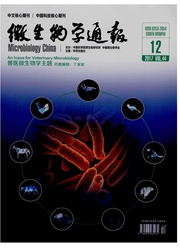

 中文摘要:
中文摘要:
【目的】研究人工构建藻菌共生体系在产油方面的特性。【方法】从BG11培养基中分离、筛选出无菌小球藻,通过人工共培养方法构建了藻菌共生体系,探讨了共生体系中小球藻的生长及产油特性。【结果】相比无菌小球藻,藻菌共生体系对于藻的生长、油脂积累以及产生生物柴油的脂肪酸组分方面都有明显的促进作用,其中细菌(Stenotrophomonas maltophilia)和小球藻构建的共生体系效果最好,小球藻生物量提高了9%,油脂含量提高了36.3%,C18-1的含量提高了259.2%。【结论】进一步说明人工共培养方法构建藻菌共生体系能够提高微藻生物柴油的质量,具有很好的利用价值。
 英文摘要:
英文摘要:
[Objective] In order to research the characteristics of artificially constructing algae symbiosis system in oil production. [Methods] aseptic Chlorella was screened and isolated from the BG11 medium, the growth and oil-producing characteristics of Chlorella in the symbiosis system were studied by artificial construction of co-culture system of algae and bacteria. [Results] The results showed that the growth of algae, accumulation of oil and the production of fatty acid components of biodiesel were significantly higher in the co-culture system of algae and bacteria compare to that of aseptic Chlorella. Co-culture system of bacteria (Stenotrophomonas maltophilia) and Chlorella has the best effect, and the biomass, oil content and C18-1 of Chlorella increased by 9%, 36.3% and 259.2% respectively. [Conclusion] This study shows that the quality of microalgae biodiesel with good utilization value can be improved by artificial construction of co-culture system of algae and bacteria.
 同期刊论文项目
同期刊论文项目
 同项目期刊论文
同项目期刊论文
 期刊信息
期刊信息
